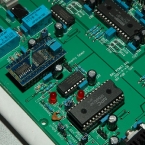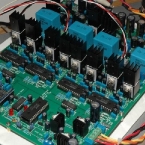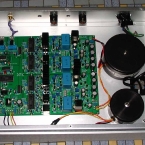This is D1V2: Changes from D1V1 is listed below.
- Add a super clock (11.2896MHz) output socket pad (J20). This is reserve for the clock to feedback back to CD transport.
- Allow more space and add holes for all TO-220 heat sink (total 15 T0-220 parts).
- Add one more relay to select digital input (K2). Use jumper to select either XLR or RCA input (J8).
- Short circuit the PCM63 Iout to BPO and thus no more jumper is required (J1-4 are eliminated).
- Enlarge all hole/pad sizes.
- Add a ground connection for the ground plan on top near main filter capacitors (J19).
- Jumper to select the “clock regulator” or “5842 regulator” for the 8414 IC (J17). Thus the regulator for 8414 will be isolated from 5842 when the on board clock is not used.
- Use LM317T and LM337T regulators (better noise performance) for all DAC chips.
- Add de-emphasis LED indicator (D32).
- Split the ground plan in sections: 8414, 5842, Input relay and logic IC, DAC left and DAC right.
- Relocate the rectification section (diodes and caps) of the 30V supply so that the last few filter caps will be closed to a centre ground point J19.
- Add “+” mark for all E-capacitors for easy polarity identification.
- Add resistor and VR for all PCM63 to trim the MSB (this adjustment is optional and reserve for DIYer to play around the trimming of MSB).
- Add Trimmer pot (R8, 9, 17 & 18) to adjust Jfet IV output level to match “+” and “-“ cycle. This is also optional and need an accurate voltmeter and test CD to do the adjustment. Do not solder the parts if not use.
Documentation:


